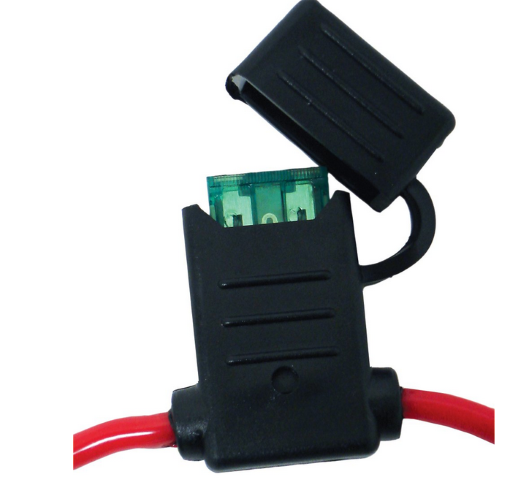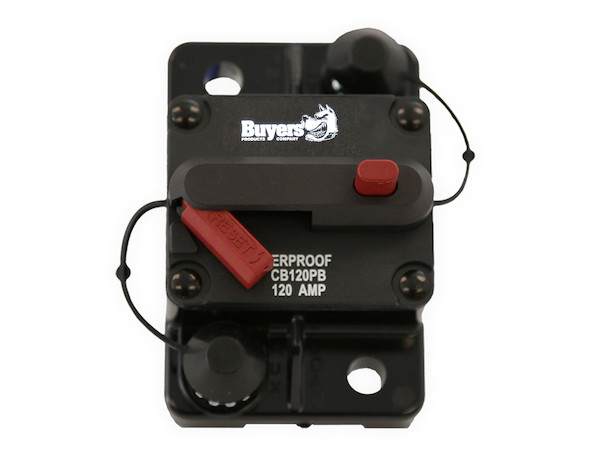Breakers and Fuses
ALL WIRES LEAVING AN ENERGY SOURCE NEED A BREAKER OR FUSE!!
Please don’t ignore the statement above. Every single (positive) wire that leaves your battery bank, turbine, solar panel, generator absolutely must be protected from short circuit and over-current by using a circuit breaker or fuse.
Can you imagine a house breaker box that did not use any breakers but instead all of the wires were simply tied to the main lug and sent on their way to the outlets? My guess is that you would never do this or buy a house that was wired this way; yet, how many of us bypass this simple rule and run wires from our battery banks directly to a “little” light bulb, fan, thinking, its just a little fan, it does not need a fuse?
Well, it may be a little fan, but it is not a little battery bank.

A battery bank can generate hundreds to thousands of amps in a split second if and when a positive wire is inadvertently grounded or shorted and there is no fuse or breaker between the positive wire and the short circuit.
EVERY wire, not just the wires going to the big devices need a breaker or fuse, in fact, the most likely cause of a fire is when a small wire is shorted or overloaded. The insulation is quickly comprised as the melting point of the plastic is exceeded and the “insulated” wire becomes a bare copper monster, shorting itself out on every piece of metal along its path and igniting every flammable object within a foot or two until the room is a blaze in fire.
Perhaps a bit dramatic but non the less, this is a story many DIY’ers can re-tell from experience, yet, sadly, installation after installation continues to bypass the breaker. Don’t do it. Use a breaker or don’t put the wire in!
There are some exceptions to the “Always” rule. It is not necessary to place a fuse on every positive wire from every solar panel, yet it is imperative that the home run from the solar panels be protected with a breaker or fuse. Why is this OK? The power generated from a single solar panel is not sufficient to melt the insulation of the wire that the manufacture has shipped it with, even if the panel is shorted from positive to negative. In addition, the electrical arch from a single panel is not as likely to generate a fire as a string of panels.
Each locality often places different restrictions and rules that may affect the number and placement of circuit protection on solar panel installations. Please check with your inspector to ensure that you are complying with the requirements. If your installation will not be subject to inspection, then use common sense and the more the better. Use a breaker or fuse on every wire that can add to the risk of fire or injury. If your not sure, put a fuse inline and rest easier.
Breaker or fuse? When is one better than the other?
Breakers can be reset since they trip, fuses blow and need to be replaced. Based on this simple fact, more often than not a breaker is generally the best choice for circuits that are more likely to have an over-current event.
Circuit breakers “can” be used as a switch. Many breakers even have a push to reset or “trip” button or lever which does indeed serve as nice switch; however, if you need to switch a circuit on and off routinely, a separate switch is recommended since most breakers are not designed for frequent switching.
There is more to the selection process than tripping vs blowing.

An inline fuse is a great choice for temporary wire runs or small devices.
Some considerations when choosing between a breaker and fuse.
Fuses:
- Fuses have a lower voltage drop (generate less heat and have less power loss), therefor are often the best choice for high power circuits like inverter feeds or a battery buss wires or bars.
- Fuses are often smaller and easier to install inline.
- Fuses can be used to “lock out” a circuit by physically removing the fuse (and taping it shut), preventing an easy path to enabling it.
- Fuses are often cheaper than breakers of the same size.
- Fuses can be slow, normal or fast blow, allowing you to tailor the fuse to the circuit.
- Fuses rarely fail to blow — they are extremely reliable.
- Most fuses are environmentally protected and can often be used in dusty or moist environments.
Breakers:
- Breakers are re-usable and often can be used as a pseudo switching device. Note: Inspectors will not accept a breaker where a switch is required for normal service. (A lighting run needs a breaker and switch.)
- Many breakers can be installed in breaker box to provide convenient and organized circuit management.
- Quality DC breakers are now more affordable, yet, most house hold A/C breakers do work in D/C circuits, but their life expectancy is greatly reduced due to the increased aching in a D/C circuit compared to an A/C circuit.
- Breakers that have lock-out mechanisms are a great choice for circuits that are likely to require service from time to time.
Summary.
Always use a breaker or fuse on each and every wire that carries current from an energy source.
Fuses and breakers both have advantages and disadvantages. Fuses are often best in high power D/C circuits to avoid power loss. Breakers are often best when the circuit is more likely to be exposed to an over-current event or you need a simple switch from time to time.



Recent Comments